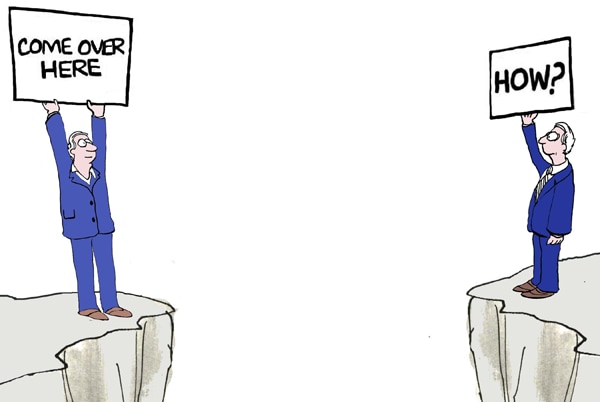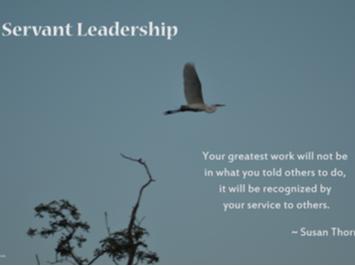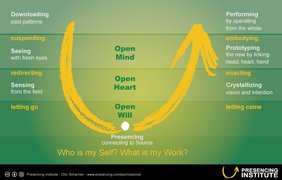Leadership Competencies
ORGL 500
|
ORGL 502
|
ORGL 503
|
ORGL 504
|
ORGL 505
|
ORGL 506
|
ORGL 522
|
ORGL 530
|
ORGL 532
|
ORGL 537
|
ORGL 620
|
COML 601
|
Course Resources
ORGL 500 - Organizational Leadership
ORGL 502 - Leadership and Imagination
ORGL 503 - Organizational Ethics
ORGL 504 - Organizational Communication
ORGL 505 - Organizational Theory
ORGL 506 - Leadership and Diversity
ORGL 522 - Leadership and Community Empowerment Collaboration and Dialogue
ORGL 530 - Servant-Leadership
ORGL 532 - Leadership, Justice, and Forgiveness
ORGL 537 - Foresight and Strategy
COML 601 - Applied Communication Research
- American Psychological Association. (2001). Publication manual of the APA, (6th ed.). New York: APA.
- Eliot, T. S. (1964). Murder in the cathedral. New York: Harvest.
- Freire, P. Pedagogy of the oppressed. New York: Continuum, 2000.
- Kouzes, J. M. & Posner, B. Z. (2008). The leadership challenge. San Francisco: John Wiley & Sons.
- Palmer, P. J. (2007). The courage to teach . San Francisco: Jossey-Bass.
- Wheatley, M. J. (2006). Leadership and the new science:Discovering order in a chaotic world, (3rd ed.). New York: Barrett-Koehler.
- Yukl, G. A. (2009). Leadership in organizations, (7th ed.). Paramus: Prentice Hall.
- Zinneman, F. (director). (1966/1999). A man for all seasons. Columbia, Tri-Star.
- Duigan, J. (director). (1989/2009). Romero. Vision Video.
- Luhrman, B. (director). (1993/2002). Strictly ballroom. Miramax.
ORGL 502 - Leadership and Imagination
- Carey, M. R. (2017, March 26). Gonzaga University. Retrieved from Blackboard Learn: https://learn.gonzaga.edu/bbcswebdav/pid-1600844-dt-content-rid-14841886_1/courses/ORGL502_B1_21552_SP15/502%20-%20Ignatius%20and%20Imagination.pdf
- Heifetz, R. A., & Marty, L. (2017, March 26). Gonzaga University. Retrieved from Blackboard Learn: https://learn.gonzaga.edu/bbcswebdav/pid-1600846-dt-content-rid-14842081_1/courses/ORGL502_B1_21552_SP15/Get_on_the_Balcony_Heifetz.pdf
- Heifetz, R., Marty, L., & Grashow, A. (2017, March 26). Gonzaga University. Retrieved from Blackboard Learn: https://learn.gonzaga.edu/bbcswebdav/pid-1600846-dt-content-rid-14842265_1/courses/ORGL502_B1_21552_SP15/theory_behind_practice.pdf
- Pink, D. (2017, March 26). Gonzaga University. Retrieved from Blackboard Learn: https://learn.gonzaga.edu/bbcswebdav/pid-1600845-dt-content-rid-14842096_1/courses/ORGL502_B1_21552_SP15/ORGL%20502%20%20IA%20Reading%281%29.pdf
- Shakespeare, W. (2017, March 26). King Richard III. Retrieved from Gutenberg: http://www.gutenberg.org/ebooks/1103
- (n.d.). The Johari Window as a Framework for EFfective Communication and Empath.
- Williams, D. (2017, March 26). Gonzaga University. Retrieved from Blackboard Learn: https://learn.gonzaga.edu/bbcswebdav/pid-1600846-dt-content-rid-14842057_1/courses/ORGL502_B1_21552_SP15/CreativeChallengeWilliams.pdf
ORGL 503 - Organizational Ethics
- Kouzes, J. M., & Posner, B. Z. (2003) Credibility: How leaders gain and lose it, why people demand it. San Francisco, CA: Jossey-Bass.
- Nicholi, A. M. (2002). The Question of God. New York, NY: The Free Press.
- Fonda, H., & Rose, R. (Producer), & Lumet, S. (Director). (1957). 12 angry men. (Motion picture). United States: Orion-Nova Productions.
ORGL 504 - Organizational Communication
- Conrad, Charles, and Marshall Scott Poole (2012, Seventh Edition). Strategic Organizational Communication in a Global Economy (Wiley-Blackwell, West Sussex, UK).
- Downs, C., and A. Adrian (2004). Assessing Organizational Communication: Strategic Communication Audits (New York: Guilford Press).
ORGL 505 - Organizational Theory
- Howard, R. (Director).Howard, R. (Director). (1995). Apollo 13 [Motion picture]. USA.
- Bolman, L. & Deal. (2008). Reframing Organizations: Artistry, Choice and Leadership. (4th edition) San Francisco: Jossey-Bass.
- Helgesen, S. (2005). The Web of Inclusion: A New Architecture for Building Great Organizations. New York: Currency/Doubleday.
- Morgan, Gareth. (2006). Images Of Organization. Thousand Oaks: Sage Publications, Inc.
Collins. (2002). Good To Great. New York: Harper Collins.
ORGL 506 - Leadership and Diversity
- Allen, B. (2010). Difference Matters: Communicating Social Identity, 2nd ed. Longrove, IL: Waveland Press.
- Bordas, J. (2007). Salsa, Soul, and Spirit: Leadership for a Multicultual Age. San Francisco: Berrett Koehler.
- Hooks, bell (2000) Where We Stand: Class Matters. New York: Routledge
- “Crash” directed by Paul Haggis
- “The Pursuit of Happyness” directed by Gabriele Muccino
- “Persepolis” directed by Marjane Satrapi and Vincent Paronnaud
- “Outsourced” directed by John Jeffcoat
ORGL 522 - Leadership and Community Empowerment Collaboration and Dialogue
- Block, P. (2008). Community: The structure of belonging. San Francisco: Berrett-Koehler.
- Casey, M. (2001). A Guide to living in the truth: Saint Benedict’s teaching on humility. Liguori, MO: Liguori/Triumph.
- Dysinger, L. (ed.). (1997). The rule of Saint Benedict: Latin & English. Trabuco Canyon: Source Books; or equivalent there are several translations.
- Palmer, P. J. (1993) To Know as We Are Known: A spirituality of education. San Francisco: Harper. ISBN: 0060664517C.
ORGL 530 - Servant-Leadership
- Hesse, H. (1988). (Hilda Rosner -Trans.). The journey to the East. New York: Noonday Press. ISBN # 0374500363.
- Ferch, R. S., Spears, L. C., McFarland, M., & Carey, M. L. (2015). Conversations on Servant-Leadership: Insights on human courage and work. New York: Suny Press. ISBN13: 978-1-4384-5508-2
- Greenleaf, R. K. (2002). Servant leadership: A journey into the nature of legitimate Dr. John H. Horsman Gonzaga University 8/7/2015 3 power and greatness. New York: Paulist Press. ISBN# 0809105543.
- Thompson, M. C. (2000). The congruent life. Hoboken: Jossey-Bass. ISBN: 0787950084.
- Greenleaf, R. K. (1998). The power of Servant Leadership. San Francisco: BerrettKoehler. ISBN-10: 1-57675-035-3.
- Sipe, J. W. & Frick, D. M. (2009). Seven pillars of servant leadership: Practicing the wisdom of leading by serving. Mahwah, NJ: Paulist Press. ISBN # 13: 978-0-8091-4560-7.
- Eastwood, C. (director). (2009). Invictus. USA: Warner Bros.
- Sargent, J. (director). (January, 2005). Something the Lord made. USA: Warner.
- Joffe, R. (director). (1986/2003). The mission. USA: Warner
ORGL 532 - Leadership, Justice, and Forgiveness
- Ferch, S. R. (2012). Forgiveness and Powr in the Age of Atrocity. Lanham: Lexington Books.
- Frankl, V. E. (2006). Man's Search for Meaning. Boston: Beacon Press.
- King, C. S. (1993). My Life with Martin Luther King, Jr. New York: Puffin Books.
- Tutu, D. (1999). No Future Without Forgiveness. New York: Doubleday.
- Wiesel, E. (1958). Night. New York: Hill and Wang.
- Wiesenthal, S. (1997). The Sunflower. New York: Schocken Books.
ORGL 537 - Foresight and Strategy
- Briskin, A., Erickson, S., Ott, J. & Callanan, T. (2009). The power of collective wisdom: And the trap of collective folly. San Francisco: Barrett-Koehler.
- Frick, D. M. & Spears, L. C. (1996). The private writings of Robert K. Greenleaf: On becoming a Servant Leader. San Francisco: Jossey-Bass. (selected readings)
- Jaworski, J. & Flowers, B. L. (Ed.). (2012). Source. The inner path of knowledge creation. San Francisco: Barrett-Koehler.
- Scharmer, C. O. & Kaufer K. (2013). Leading from the emerging future: From ego- system to eco-system economies-applying Theory U to transforming business, society, and self. San Francisco: Barrett-Koehler.
COML 601 - Applied Communication Research
- Neuman, W. L. (2013). Social research methods: Qualitative and quantitative approaches Pearson Education. Retrieved from http://www.vlebooks.com/vleweb/product/openreader












